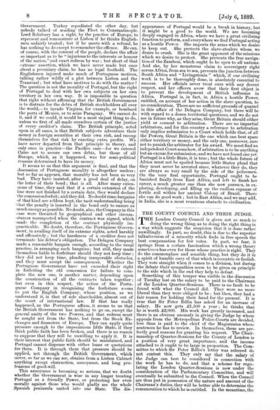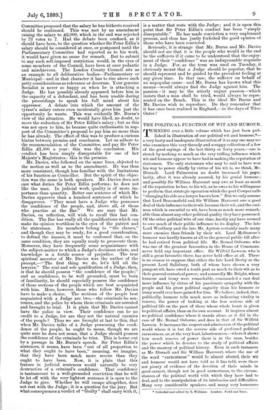THE COUNTY COUNCIL AND THEIR JUDGE. T HE London County Council
is given not so much to doing the wrong thing, as to doing the right thing in a way which suggests the suspicion that it is done rather unwillingly. In part, no doubt, this is due to the superior talkativeness of a minority which finds in free speech the best compensation for few votes. In part, we fear, it springs from a certain fascination which a wrong theory sometimes has even for those whose practice is right. They do the commonplace and sensible thing, but they do it in a spirit of humble envy of that which is eccentric or foolish. They vote straight when it comes to a division, but during the debate their sympathies seem to be given on principle to the side which in the end they help to defeat.
Something of this temper was visible in the discussion of Tuesday last on the salary to be paid to the Chairman of the London Quarter-Sessions. There is no fault to be found with what the Council did. They were no more liberal than they were obliged to be ; but then, they had a fair reason for holding their hand for the present. It is true that Sir Peter Edlin has asked for an increase of salary. He now gets £1,500 a year ; he thinks that he is worth .22,000. His work has greatly increased, and there is an obvious anomaly in giving the Judge by whom appeals from the Metropolitan Police-Courts are decided, less than is paid to the chief of the Magistrates whose sentences he has to review. In themselves, these are per- fectly good reasons for granting his request. The Chair- manship of Quarter-Sessions for the County of London is a position of very great importance, and the income attached to it ought to be large in proportion. The Com- mittee to which Sir Peter Edlin's letter was referred do not contest this. They only say that the salary of the Judge can best be considered in connection with the work he has to do, and that a scheme for regu-. lating the London Quarter-Sessions is now under the consideration of the Parliamentary Committee, and will eventually be submitted to the Council. When the Council are thus put in possession of the nature and amount of the Chairman's duties, they will be better able to determine the remuneration to which he is entitled. In the meantime, the Committee proposed that the salary he has hitherto received should be continued. This was met by an amendment raising the salary to £2,000, which in the end was rejected by 73 votes to 7. Had the debate been confined, as it should have been, to the question whether Sir Peter Edlin's salary should be considered at once, or postponed until the Parliamentary Committee had reported as to his work, it would have given no cause for remark. But to submit to any such self-imposed restriction would, in the eyes of some members of the Council, have been at once pedantic and mischievous. The London County Council sits as an example to all deliberative bodies—Parliamentary or Municipal—and in that character it has to rise above such petty considerations as relevance or decorum. Your genuine Socialist is never so happy as when he is attacking a Judge. He has possibly already appeared before him in the capacity of a defendant, and has been unable during the proceedings to speak his full mind about his oppressor. A debate into which the amount of the tyrant's salary enters even incidentally gives him just the opportunity he wants. This was evidently Mr. Burns's view of the situation. He would have liked, no doubt, to move the reduction of Sir Peter Edlin's salary ; but as this was not open to him, he became quite enthusiastic in sup- port of the Committee's proposal to pay him no more than he has already. The effect of this was to produce a curious hiatus between premiss and conclusion. Let us adhere to the recommendation of the Committee, and pay Sir Peter Edlin :R1,500 a year : this was the conclusion. His conduct has been simply disreputable for one of her Majesty's Magistrates : this is the premiss. Mr. Davies, who followed on the same lines, objected to the motion as well as to the amendment. He was thus more consistent, though less familiar with the limitations of his function as Councillor. But the spirit of the objec- tion was the same in both speakers. Mr. Davies does not care what duties Sir Peter Edlin performs ; he does not like the man. In judicial work, quality is of more im- portance than quantity. Better one sentence of which Mr. Davies approves than a hundred sentences of which he disapproves. "They must have a Judge who possesses the confidence of the people, and, above all, of those who practise at the Bar." We are sure that Mr. Davies, on reflection, will wish to recall this last con- dition. The Bar has really all the qualifications which can make its opinion worthless in the eyes of the patriot and the statesman. Its members belong to " the classes," and though they may be ready, for a good consideration, to defend the masses, it must be confessed that, on the same condition, they are equally ready to prosecute them. Moreover, they have frequently some acquaintance with the subject-matter to which a Judge's decisions relate, and knowledge is a fertile source of prejudice. The true spiritual ancestor of Mr. Davies was the author of the precept,—" The first thing we do, let's kill all the lawyers." The real and sole qualification of a Judge, then, is that he should possess "the confidence of the people ;" and as confidence, to be well grounded, must be born of familiarity, he should especially possess the confidence of those sections of the people which are best acquainted with him. Here, however, those who follow Mr. Davies have to make a choice. The sections of the people best acquainted with a Judge are two,—the criminals he sen- tences, and the police by whom these criminals are arrested and brought to trial. It is plain that Mr. Davies cannot have the police in view. Their confidence can be no credit to a Judge, for are they not the natural enemies of the people ? Thus we are brought at last to this, that when Mr. Davies talks of a Judge possessing the confi- dence of the people, he ought to mean, though we are quite sure he does not mean, that a. Judge should possess the confidence of the criminals he tries. This is borne out by a passage in Mr. Burns's speech. Sir Peter Edlin's sentences, it seems, have been "out of all proportion to what they ought to have been," meaning, we imagine, that they have been much more severe than they ought to have been. Now, it is plain that this feature in judicial sentences would naturally be very destructive of a criminal's confidence. That confidence is tantamount to a well-grounded conviction that he will be let off with the very lightest sentence it is open to the Judge to give. Whether he will escape altogether, does not rest with the Judge ; it is a question for the jury. But what consequences a verdict of "Guilty" shall carry with it, is a matter that rests with the Judge ; and it is upon this point that Sir Peter Edlin's conduct has been "simply disreputable." He has made conviction a very unpleasant process, and thus has justly forfeited the good opinion of those who have been convicted.
Seriously, it is strange that Mr. Burns and Mr. Davies should not see that it is the people who would in the end be the sufferers if it came to be understood that the enjoy- ment of their " confidence " was an indispensable requisite in a Judge. For, as the term was used on Tuesday, it obviously meant that a Judge should be popular, that he should represent and be guided by the prevalent feeling at any given time. In that case, the sufferer on behalf of an unpopular cause—and. Mr. Burns has known what this means—would always find the Judge against him. The passion—it may be the utterly unjust passion—which insists that a man shall be tried, would always be repre- sented on the Bench. This is the ideal Mr. Burns and Mr. Davies wish to reproduce. Do they remember that it has once been realised in England,—in the days of Titus Oates ?











































 Previous page
Previous page